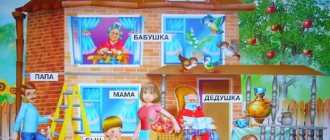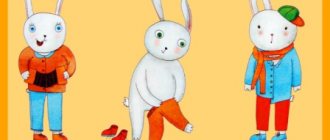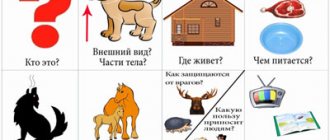Game lesson on speech development on the topic “Dishes”
- February 20, 2013
Competition “My Pedagogical Initiative - 2012”
Nomination “Methodological work in preschool educational institutions”
In various game situations during speech therapy classes, children acquire correct speech skills. During preliminary work, children acquire sufficient experience in orientation on this topic.
Therefore, I conduct final classes in each period of speech therapy work as a festive event. It is not entertaining, but educational. This is a kind of result, a generalization of all acquired knowledge, skills and abilities. After all, the child most fully and clearly perceives and remembers what affected him most emotionally, what was interesting to him.
Unlike ordinary children's parties, where, as a rule, the most lively and capable people are occupied, all children participate here. To gain confidence in their own knowledge, children are given the opportunity to show themselves and others their awareness of a given topic.
Preparation for the final lesson takes 3–4 days. Accompanied by thematic conversations, didactic speech games, display of visual material, reading fiction: poems, fairy tales, short stories, riddles; I teach in advance how to compose descriptive stories about any piece of utensils according to a diagram.
The lesson is structured in the form of a problem situation, in the form of a “provocative” dialogue with children, which allows preschoolers to think about the properties and quality of the materials from which the dishes are made, to better understand the topic, broaden their horizons, and enrich their vocabulary.
The effectiveness of this lesson is quite high due to the fact that the basic knowledge of preschoolers on the topic “Utensils” finds its application in it. Children clearly feel the value of the skills they have accumulated and apply them in practice (in conversation, didactic games, art activities, etc.).
The presented summary traces the interdisciplinary connection of classes in “The world around us”, “Speech development”, “Mathematics”, “Art activities”, “Music”. Individual handout cards with tasks that develop logic and children's thinking are original, made specifically for this lesson and have not been used or used anywhere before.
It is recommended that the lesson be conducted in a fun, emotional, and playful manner, evoking positive emotions in children from the correct answers they give. Everything should contribute to a joyful and upbeat mood in children and their free speech communication.
Program content
Goals:
- Continue to instill interest in the life of the Russian village.
- To consolidate children's knowledge about modern and ancient dishes.
- To consolidate knowledge about different types of utensils and their purposes.
- Expand children's active and passive vocabulary.
- Formation of lexical-grammatical structure and coherent speech.
- Develop perception, attention, memory, thinking, imagination and
- emotional-volitional processes.
- Develop graphic skills.
- Cultivate a caring attitude towards dishes.
Tasks:
- activate the dictionary on the topic “Dishes”, a dictionary of synonyms, encourage them to practice word formation.
- improve the grammatical structure of speech, the ability to coordinate adjectives in gender, number, and case.
- activate mental activity, learn to solve riddles and resolve problem situations.
- consolidate the ability to write descriptive stories about dishes.
Techniques of cognitive and speech development:
- verbal technique: conversation, question - answer;
- solving a problem situation;
- didactic games: “Add the required piece of utensils to each group”, “Find the pattern”, “Count and name”, “Color the outline of the samovar”;
- visual technique.
Vocabulary work:
- Active vocabulary: cast iron, samovar, grip, iron, wood, glass, shiny, transparent.
- Passive vocabulary: painted, porcelain, plastic, clay.
Preliminary work:
- Reading the work of K. Chukovsky “Fedorino’s grief.”
- Games on the theme “Dishes”;
- Musical game “Bai-kachi-kachi-kachi”.
- Introducing children to the properties of wood, glass, iron, clay, cast iron.
- Training in writing descriptive stories about any item of utensils according to a diagram.
Equipment:
- suit for Fedora,
- samovar,
- cast iron,
- pot,
- iron and wooden spoons,
- any aesthetically made dishes,
- individual tasks (cards),
- visual aids (photos of samovars),
- outlines of samovars, paints, pencils.
Appendix 1: Speech therapy lesson notes.
Author: Tatyana Aleksandrovna Zykina, teacher-speech therapist at MBDOU No. 312 “Katyusha”, Rostov-on-Don. Work experience in the specialty is 10 years.
MAGAZINE Preschooler.RF
Permyakova Svetlana Sergeevna Municipal budgetary preschool educational institution "Kindergarten No. 82 of a combined type" Position - teacher-speech therapist Kamensk - Ural Sverdlovsk region Summary of a lesson on speech correction and development in the senior compensatory group for children with speech disorders. Subject. Dishes. Tasks. • 1.Practice in the formation of related words using the suffixes –nits-, -ish-, diminutive suffixes, practice in the formation of relative adjectives. Activate the dictionary on the topic “Dishes”. Learn to classify utensils. Learn to agree nouns and numerals, use nouns in indirect cases. • 2.Develop children's attention, logical thinking, and coherent speech. • 3. To develop children's self-service skills and accuracy when handling utensils. Equipment. Subject pictures: Fedora, cards depicting various numbers of utensils, subject pictures depicting products and the utensils in which they are stored.Progress of the lesson. 1. Organizational moment. -I see. that someone is coming to visit us for class, but I can’t find out who it is? Maybe you can help me? The sieve gallops across the fields, and the trough bounces across the meadows. The broom followed the shovel along the street. Axes, axes, and so they fall from the mountain. Behind them are saucers - Ting-la-la, Ting-la-la, Along the street they rush Ting-la-la, Ting-la-la, They bump into glasses, Tink, And the glasses, Tink, break... And behind them, they jump along the fence grandmother...(Fedora).
2.Message about the topic of the lesson. -Please remind me, what happened at Fedora’s? (The dishes ran away from her.) -Why do you think this happened? (Fedora did not know how to handle the dishes and did not take care of them). -Let's tell Fedora about the dishes today. Maybe then the dishes will return to her. 3. Studying new material. 1) Formation of relative adjectives. -Shall we tell Fedora what the dishes are made of? (Made of metal, glass, plastic, porcelain,...). Game "Form the word." Glass glass - glass, porcelain cup - porcelain, metal pan - metal, cast iron frying pan - cast iron, clay jug - clay, plastic plate - plastic, wooden spoon - wooden. 2) Formation of nouns using the suffix –nits-. -We have special dishes for storing different products. In order to get the name of the cookware, you need to add a particle -nits- to the name of the product. Game “Hitch the trailer” Sugar - sugar bowl, pepper - pepper shaker, herring - herring bowl, bread - bread box, ... But there are names of dishes that are formed with the help of other particles: tea - teapot, butter - butter dish, salt - salt shaker, milk - milk jug, coffee -coffee pot. 3) Activation of the verb dictionary. -Tell Fedora, how should you take care of the dishes? (Wash, clean, rinse,...). 4) -In order for Fedora to use the utensils correctly, we will tell her what they do with what. (Game “Pick up an object.” Formation of nouns in the form of oblique cases.) Cut with what? (With a knife.) What do you pour soup into a plate with? (With a ladle.) What do you eat mashed potatoes with? (With a fork.) What do they drink tea from? (From a cup.) Juice is drunk from what? (From a glass.) What do you eat porridge from? (From a plate.) What is the coffee poured from? (From a coffee pot.) What do you brew tea in? (In a teapot.) Physical exercise. -We've worked hard, it's time to rest. The guests ran to the samovar, together they filled the cups: Delicious tea at the samovar, It contains chamomile infusion. Children stand in a circle, one child is in the middle. They go to the middle of the circle and say hello. They disperse. They walk in a circle, one after another. 5) Classification of utensils. Game "Fourth wheel". -The dishes returned to Fedora, and she is very happy. Fedora began to put it in its place and got something wrong. Let's help Fedora put everything right. -Cup, teapot, saucepan, sugar bowl. (An extra saucepan, since this is a kitchen utensil, and everything else is teaware.) -A saucepan, a teapot, a saucer, a frying pan. -Plate, spoon, fork, coffee pot. 6) -But in Fedora’s house there was more than one spoon and more than one plate. Let's count how many dishes Fedora had. (Correlating nouns and numerals. Work using cards.) 7) -Fedora was so happy about the return of the dishes that she decided to have a party. She invited her friends the gnome Filya and the giant Venya to it. But their dishes should be completely different. Game "Dwarfs and Giants". (Formation of nouns with the help of diminutive suffixes and the suffix -ish-.) Spoon - spoon - spoon. Mug - mug - circles. ... 4. Summary of the lesson. -I liked how well you did today. And Fedora really enjoyed staying with such smart guys. She learned a lot of new things. What new did you learn? What did you like? What task was difficult to complete?
| Next > |



